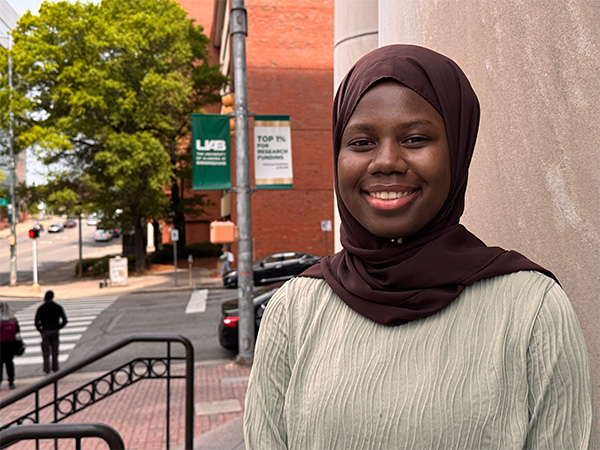 Our Get to Know series highlights researchers from across the UAB Comprehensive Diabetes Center (UCDC), particularly those who manage day-to-day operations in the lab space. This month, we get to know Khadija Seck, lab manager of the Habegger Lab.
Our Get to Know series highlights researchers from across the UAB Comprehensive Diabetes Center (UCDC), particularly those who manage day-to-day operations in the lab space. This month, we get to know Khadija Seck, lab manager of the Habegger Lab.
Tell us a little bit about you and your role at the UCDC.
I’m originally from the U.S., but my family is from Senegal, and I grew up traveling back and forth between both places, which helped shape my perspective on health and science. I still go to Senegal every chance I get. I’ve been at UAB for several years, first as an undergraduate student in Biomedical Sciences and Philosophy, then as a graduate student in Biotechnology, and now as the lab manager in Dr. Kirk Habegger’s lab. In this role, I oversee daily lab operations, help coordinate experiments and ensure that everything runs smoothly.
What first got you interested in diabetes research?
Honestly, I didn’t know much about diabetes research when I first joined the lab. I was mainly looking to gain more hands-on experience in a research setting. But once I started working on some of the projects, I got completely hooked. I remember seeing early experiments where mice were treated with certain agonists and started losing body weight in response, and it blew my mind that a molecular intervention could have such a visible and measurable effect. That curiosity quickly turned into a deeper interest in understanding the metabolic pathways driving those changes, and how that could be applied to help people living with diabetes.
Tell us a little bit about your lab’s research or current projects.
Our lab focuses on diabetes and the different metabolic pathways that contribute to the disease, especially in the context of obesity and insulin resistance. One project I’ve been particularly involved in is studying the effects of a GIP and IUB288 combination therapy in DIO (diet-induced obese) mice. GIP (glucose-dependent insulinotropic peptide) is a hormone produced by the small intestine in response to a meal and plays a role in helping your body store those nutrients appropriately. IUB288 is an analog of the pancreatic hormone, glucagon, which is a crucial regulator of glucose and lipid metabolism. We’re looking at how this combo impacts body weight, glucose tolerance, and insulin sensitivity. It’s been exciting to see how combining two different targets, GIP and IUB288, can work together to improve outcomes. While there are already treatments that target multiple pathways, seeing this specific combination show strong effects in DIO mice has been really promising and makes me curious about what it could mean for future therapies.
What does it mean to be a lab manager, and how does it feel contributing to the UCDC’s mission?
Being a lab manager means doing a lot of the behind-the-scenes work that might seem small, but really forms the foundation of how the lab runs. Things like genotyping, keeping supplies stocked, or making sure protocols are followed are baseline tasks that every lab depends on. They might not always be flashy, but they’re essential to the integrity of experiments and the quality of data. Contributing to UCDC’s mission through that kind of work feels meaningful because I know I’m helping keep things solid and consistent so the team can focus on discovery.
What advice would you give a new lab manager?
Write everything down. Seriously. I used to think I had a great memory until I became a lab manager. Between keeping track of genotyping results, supply orders, schedules, and all the little things that pop up, it’s just not realistic to rely on memory alone. Having clear notes and documentation makes everything easier and not just for yourself, but for anyone else who might need to pick up where you left off. And there will be someone picking up where you left off.
What do you enjoy or like to do outside of the lab?
I love eating. I know all the best food spots in Birmingham and love introducing people to them. Outside of research, I’m also passionate about social justice and community work. I currently serve as the program coordinator for a nonprofit focused on health equity and civic engagement and it’s through that work that I’ve had the honor of sitting down for dinners with the surviving McNair sisters from the 16th Street Church bombing. I previously worked with the Birmingham Civil Rights Institute to help develop stories based on their archives for their mobile app. I'm also one of the voices on their guided walking tour, which was such an amazing experience.
I also spent time with the Jefferson County Memorial Project, where I worked in the archives researching unsolved lynching cases in Alabama and helping to connect those stories to local history. It was heavy work, but really important and meaningful. When I’m not doing any of that, I enjoy strength training, traveling, reading poetry, and just spending time with my cats or going out with friends. Above all else, my favorite thing is spending time with my best friend and husband, Wesam.